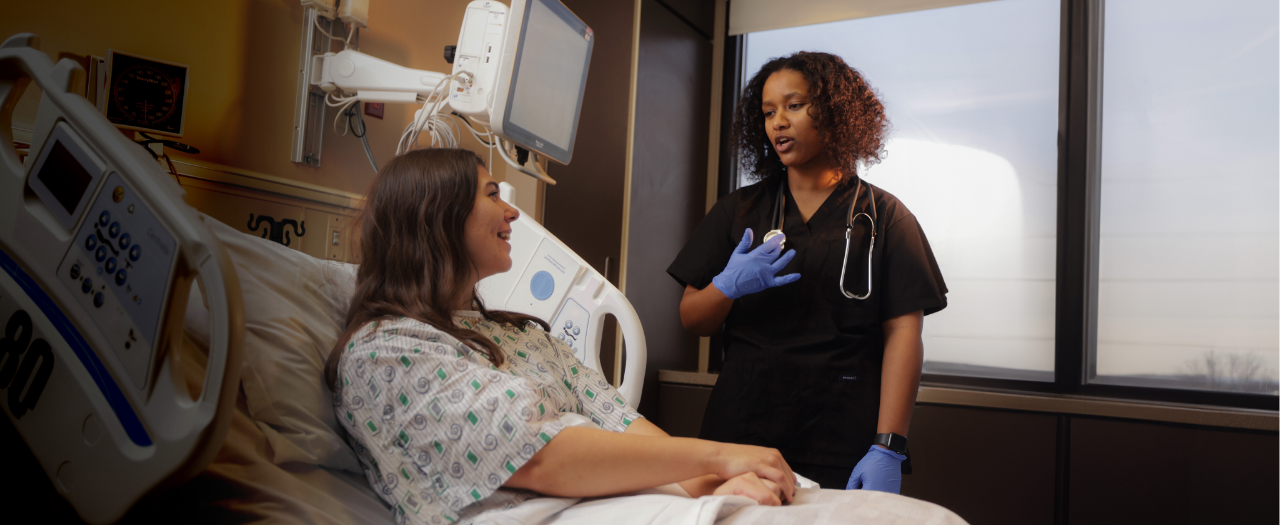EKU Colonels are well known for serving others and their communities. Many students come to EKU to pursue their dreams of careers helping others. Many graduates then return to their hometowns to serve in meaningful ways. This especially holds true for EKU’s healthcare-related majors. Demonstrating the impact on the Commonwealth, more than three-fourths of EKU health majors are employed in Kentucky within one year after graduation.
Katelyn Hall, a 2021 nursing graduate, is a prime example. She said, “I chose EKU because the nursing program is known for being exceptional. Every hospital knows and wants EKU nurses!”
“Our Health Science programs exemplify EKU’s guiding principle of excellence,” said Dr. Daniel Czech, dean of the College of Health Sciences. “Higher education institutions revolve around enrollment outcomes, and although that is important to us, quality pedagogy and student success lead our passions. We have great enrollment within the College of Health Sciences, but our excellent retention, progression and graduation rates lead the way.”
EKU’s nursing program is highly regarded, earning prestigious rankings by The Princeton Review, U.S. News & World Report and others. Additionally, EKU landed among U.S. News & World Report rankings in Occupational Therapy, Speech-Language Pathology, Public Health, Psychology and Clinical Psychology. Other health-related programs offered at EKU include biomedical science (pre-med), medical laboratory science, emergency medical care, exercise and sport science, and food and nutrition.
“EKU graduates prove that positive change is not only possible but that it is already happening right here in our region,” said EKU President David McFaddin. “With our proposed College of Osteopathic Medicine, we have a unique opportunity where the nurse, the nurse practitioner, the attending physician and the specialists can work and learn together just like they would in a hospital setting. Being able to have them all together in a simulated environment on campus would innovate healthcare training and make our students highly valued for the workforce.”
EKU’s already established and reputable health programs, along with the proposed College of Osteopathic Medicine, would position the university as a leader in healthcare education.
Brad Hall, EKU executive-in-residence and presidential fellow for strategic initiatives, noted that the university’s plan for integrated healthcare matches a shift in the healthcare industry toward value-based care—working across disciplines to address the overall health of the patient.
“Educating future healthcare providers in an interdisciplinary setting is crucial preparation for hospitals and health systems to be able to deliver high-quality and efficient care in an ever-changing environment,” said Hall.
EKU’s immersive healthcare training environment ensures students graduate ready to fulfill the needs of the Commonwealth and its residents. Through clinical opportunities and resources, such as the on-campus nursing simulation lab, students get hands-on and real-world experience, allowing them to begin their careers with the tools and expertise to address the issues immediately facing their communities.
“When our students graduate from our health programs, they’re ready to be practitioners,” said Hall. “At Eastern, we are educating practitioners to hit the ground running as soon as they graduate.”
Dr. Dana Howell, department chair and professor in the Department of Occupational Science and Occupational Therapy, added, “Many students come to our program with the intent to return to their hometown once they graduate. Many of them complete their fieldwork and capstone experience in their hometown, so the region benefits by having caring healthcare workers who are already committed and engaged in their community.”
By expanding its reach through the proposed College of Osteopathic Medicine, EKU aims to further meet the demand for healthcare access in the Commonwealth. The feasibility study on the program by Deloitte Consulting noted that Kentucky faces a shortage of physicians, particularly in rural areas. According to the Rural Health Information Hub, 107 of the 120 counties in Kentucky are considered health professional shortage areas. The Kentucky Center for Statistics projects a shortage of 644 physicians and 751 primary-care physicians by 2031. EKU anticipates the proposed College of Osteopathic Medicine will help to fill the gap in Kentucky’s rural communities by recruiting, training and retaining physicians in the area.
“Our commitment is shown through the university’s vision and commitment to expanding into the College of Osteopathic Medicine,” said Hall. “We’re reaching out to make those relationships with hospitals and rural health clinics to build on the foundation we already have. We want to be the school of choice for students who want to be health professionals.”
Interested in a degree from EKU?
Earn your undergraduate, graduate or doctoral degree from a university that has been an education leader for more than 100 years. Choose from a variety of in-demand and nationally recognized academic programs, offered both online and on-campus.
Whether you want to start, finish or advance your education, EKU has a program that can fit your schedule and your needs. Complete the form to learn more about how EKU can help advance your career.
Eastern Kentucky University is accredited by the Southern Association of Colleges and Schools Commission on Colleges (SACSCOC) to award associate, baccalaureate, masters, educational specialist, and doctorate degrees.


